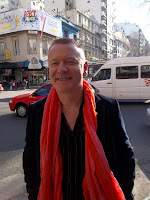by Robert Toperter
Interlitq has today decided to make an official complaint to Arts Council England (ACE) on the grounds of “possible conflict of interest” and “lack of transparency” in view of the fact that the “assessor” in this case has acted as a Contributing Editor for another international literary review, and earlier today was tweeting in this capacity.
 Currently in London, Peter Robertson (left), the Scottish journalist and literary translator who is also the President of the international literary review, Interlitq (www.interlitq.org), a not-for-profit corporation based in the State of New York, is adamant that the publication “will continue to promote New Zealand’s literature despite the disappointing decision made by Arts Council England (ACE) not to fund us”.
Currently in London, Peter Robertson (left), the Scottish journalist and literary translator who is also the President of the international literary review, Interlitq (www.interlitq.org), a not-for-profit corporation based in the State of New York, is adamant that the publication “will continue to promote New Zealand’s literature despite the disappointing decision made by Arts Council England (ACE) not to fund us”. Robertson admits that ACE’s decision not to give funding to the review has taken him by surprise. “Since June 2010, Arts Council England has been encouraging Interlitq to apply for funding. We had meetings in London, and they informed us on several occasions that they considered Interlitq to be an ‘excellent’ publication. They have also stated this opinion in their correspondence to us, and the day after we received notification that they had decided to turn down Interlitq for funding, they wrote to us again, stating that they found the review to be ‘excellent’.”
It has been no easy task for Robertson to square these affirmations of “excellence” with the sole reason given by ACE for turning down Interlitq earlier this month, when the government agency declared that it had found the review to display “weaknesses in relation to artistic clarity”.
Stalwart in his defence of Interlitq, Robertson wastes no time in taking issue with this appraisal. “We have been publishing strong literary work for four years, and I would have thought that our objective by now is clear. We have published Nobel laureates and new voices, and in many literary genres. Arts Council England has given funding to a number of publications that have published in one language, this being in English, and we have published work in more than 90 languages, and nonetheless ACE says ‘no’ to us in our quest to challenge ethnocentric concepts of literature. Personally, I find ACE’s perspective to be ‘little Englander’.”
Undeterred by ACE’s decision, over coming months Robertson will press ahead with the publication of part 2 of “A New Zealand Literary Showcase”, and other projected features including “The Far-Flung Voice: The UK’s Literature of Exile”, and a major feature on Panamanian literature, to be published in Spanish, and featuring the artwork of Panamanian artist, Olga Sinclair. Furthermore, Issue 17 of Interlitq will be published over coming weeks, showcasing yet another gamut of prestigious international literature, and including Christopher Betts’s translations of work by La Fontaine, and Suzanne Jill Levine’s translation of a poem by Borges, the first time this poem has been published in English.
Robertson winds up by saying: “With regard to the negative decision, Interlitq is about to make an official complaint to Arts Council England (ACE) on the grounds of ‘possible conflict of interest’ and ‘lack of transparency’ in view of the fact that the ‘Assessor’ in this case has acted as a Contributing Editor for another international literary review, and earlier today was tweeting in precisely this capacity. It strikes us that, bearing this in mind, we can make a cogent case for ACE’s decision having been somewhat less than impartial. Moreover, I am not surprised that the stated reason for the non-funding is Interlitq’s putative ‘weaknesses in relation to artistic clarity’ as, under the circumstances, the ‘Assessor’ might well consider Interlitq to be a competitor, even though the truth is that we publish literature of a very different nature from that showcased in his review.”
Robert Toperter is a freelance journalist living in London.





